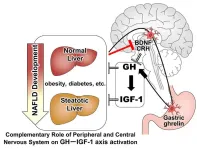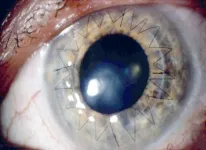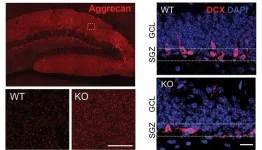(Press-News.org) The annual meeting for the American Physical Society’s (APS) Division of Fluid Dynamics will begin in two weeks with presentations on new research in aerodynamics, turbulence, wind and water power, bubbles, culinary fluid dynamics, medicine, and more. The conference will be held in person at the Walter E. Washington Convention Center in Washington, DC, Nov. 19-21.
There are no press conferences planned for this year’s program. However, a tip sheet highlighting newsworthy presentations is now available in the meeting’s press kit. Registered journalists and press officers will receive emails with press information daily for the duration of the meeting and have access to a press room with light refreshments.
Science Writers Happy Hour
In partnership with the DC Science Writers Association (DCSWA), APS will host a happy hour for press registrants and DCSWA members in the press room on Nov. 20 at 5:30 p.m. Complimentary beer, wine, non-alcoholic beverages, and snacks will be served.
Private Access: Smithsonian’s National Air and Space Museum
Press registrants may join other meeting attendees for an after-hours tour of eight new galleries at the Smithsonian’s National Air and Space Museum on Nov. 20 from 6:30-10:00 p.m. ET.
Gallery of Fluid Motion
The annual Gallery of Fluid Motion — a visual arts competition and exhibition that illustrates the science and beauty of the motion of fluids — will be held at the meeting. Winners will be announced in a ceremony on Nov. 20.
Select sculptures, pictures, and videos from past Gallery of Fluid Motion entries are on display in a new exhibition called “Chaosmosis: Assigning Rhythm to the Turbulent” at the National Academy of Sciences building in Washington, DC, as part of the Cultural Programs of the National Academy of Sciences. The exhibition is free and open to the public on weekdays between 8 a.m. and 5 p.m. ET through Feb. 23.
Scientific Program
The scientific program includes nearly 400 sessions and more than 3,200 presentations spanning all topics in the physics of fluids. For more information, search the scientific program. All times are in US Eastern time.
Press Registration
News media and public information officers with valid APS press credentials may register for the meeting at no cost. To request press credentials, visit APS’s virtual press office. Registration will remain open throughout the meeting.
# # #
The American Physical Society is a nonprofit membership organization working to advance and diffuse the knowledge of physics through its outstanding research journals, scientific meetings, and education, outreach, advocacy, and international activities. APS represents more than 50,000 members, including physicists in academia, national laboratories, and industry in the United States and throughout the world.
END
The sky is no longer the limit — but taking flight is dangerous. In leaving the Earth’s surface, we lose many of the cues we need to orient ourselves, and that spatial disorientation can be deadly. Astronauts normally need intensive training to protect against it. But scientists have now found that wearable devices which vibrate to give orientation cues may boost the efficacy of this training significantly, making spaceflight slightly safer.
“Long duration spaceflight will cause many physiological and psychological stressors which will make astronauts very susceptible to spatial disorientation,” ...
Niigata, Japan – The research group of Professor Kamimura in Niigata University have demonstrated the complementary role of peripheral and central nervous system on GH–IGF-1axis activation to prevent MASLD progression. IGF-1 ameliorates fatty infiltration in the liver. Its release is controlled by GH and GH activation is managed by peripheral or central nervous system. However, the role of this axis in MASLD developmental phase has not been well identified. Our study demonstrated that the GH–IGF-1 axis is significant in inhibiting the progression of MASLD. In addition to the peripheral autonomic ...
Researchers have reached an agreement on how best to measure the severity and impact of Long COVID by identifying a “Core Outcome Measure Set” (COMS).
The research, published in Lancet Respiratory Medicine is co-led by the Institute of Psychiatry, Psychology & Neuroscience (IoPPN) at King’s College London and in collaboration with the World Health Organisation (WHO).
COMS are designed to help researchers and clinicians measure symptoms and impacts of disorders such as Long COVID in the same way, which optimises how data can be compared and summarised. Researchers say this will accelerate the understanding of, and the development ...
A new Cochrane review has found that insulin can be kept at room temperature for months without losing potency, offering hope to people living with diabetes in regions with limited access to healthcare or stable powered refrigeration. This affects millions of people living in low- and middle-income countries, particularly in rural areas, as well as people whose lives have been disrupted by conflict or natural disasters.
Human insulin is a hormone produced by the body that helps turn food into energy and controls blood sugar levels. People with diabetes cannot make enough insulin and those with type 1 diabetes have to inject insulin several times a day, typically before every meal. ...
EMBARGOED: Not for Release Until 00:01 AM (UK Time) on Friday 3 November 2023
New research highlights the need for routine discussions about eye donation in end-of-life care clinical settings
Less than four per cent of eligible patients in end-of-life care settings were asked to consider eye donation
Patients had positive views about eye donation, but most did not know it could be an option for them
Staff need training and guidance to support discussing eye donation with patients
A new study has found there is significant scope to increase the number of eye donations from patients cared for in hospice and palliative care settings - donations which are desperately needed for ...
PHILADELPHIA— Phenylketonuria (PKU) is a rare newborn genetic disease that impacts between 1 in 10,000 to 1 in 20,000 people, depending on the individuals’ genetic ancestry. PKU causes an amino acid—called phenylalanine (Phe)—to build up in the bloodstream. Uncontrolled PKU can lead to intellectual disability, psychiatric issues, and seizures. While current therapies can partially improve outcomes, they require meticulous, lifelong compliance that is very difficult for most patients. ...
Mount Sinai researchers have shed valuable light on the mechanism of a key protein that regulates the plasticity and function of the hippocampus, a key brain region involved in memory and learning, and that decreases with age in mice.
The team’s findings, published in Molecular Psychiatry, could pave the way for a better understanding of how the protein, known as tissue inhibitor of metalloproteinases 2 (TIMP2), could potentially be targeted in age-related disorders like Alzheimer’s disease to help restore ...
University of Houston Assistant Professor of Biology and Biochemistry Quentin Vicens has been awarded a $1.2 million grant from the National Institute of General Medical Sciences to unravel the mystery of Z-RNA – an enigmatic RNA structure within our cells that plays a critical role in immune response. This work is in collaboration with the laboratory of Beat Vögeli, associate professor at the University of Colorado and co-recipient of the award.
Vicens, Vögeli and their research teams are on a mission to understand how Z-RNA forms, how often it appears in our genetic material and what it means for ...
Highlights
In a preclinical study, altering the intestinal microbiome with narrow-spectrum antibiotics affected organ damage associated with hypertension.
Results from the study will be presented at ASN Kidney Week 2023 November 1–November 5.
Philadelphia, PA (November 2, 2023) — New research in rodents indicates that altering gut microbes may affect the development of organ damage associated with hypertension. The findings will be presented at ASN Kidney Week 2023 November 1–November ...
Highlights
Investigators found that in patients with diabetes and cancer, sodium glucose cotransporter-2 inhibitors were associated with a higher risk of diabetic ketoacidosis and fracture and a lower risk of acute kidney injury and urinary tract infection compared with glucagon-like peptide 1 receptor agonists.
Results from the study will be presented at ASN Kidney Week 2023, November 1–November 5.
Philadelphia, PA (November 2, 2023) — Sodium-glucose cotransporter-2 inhibitors (SGLT2i) have heart- and kidney-related benefits for patients with and without diabetes ...



